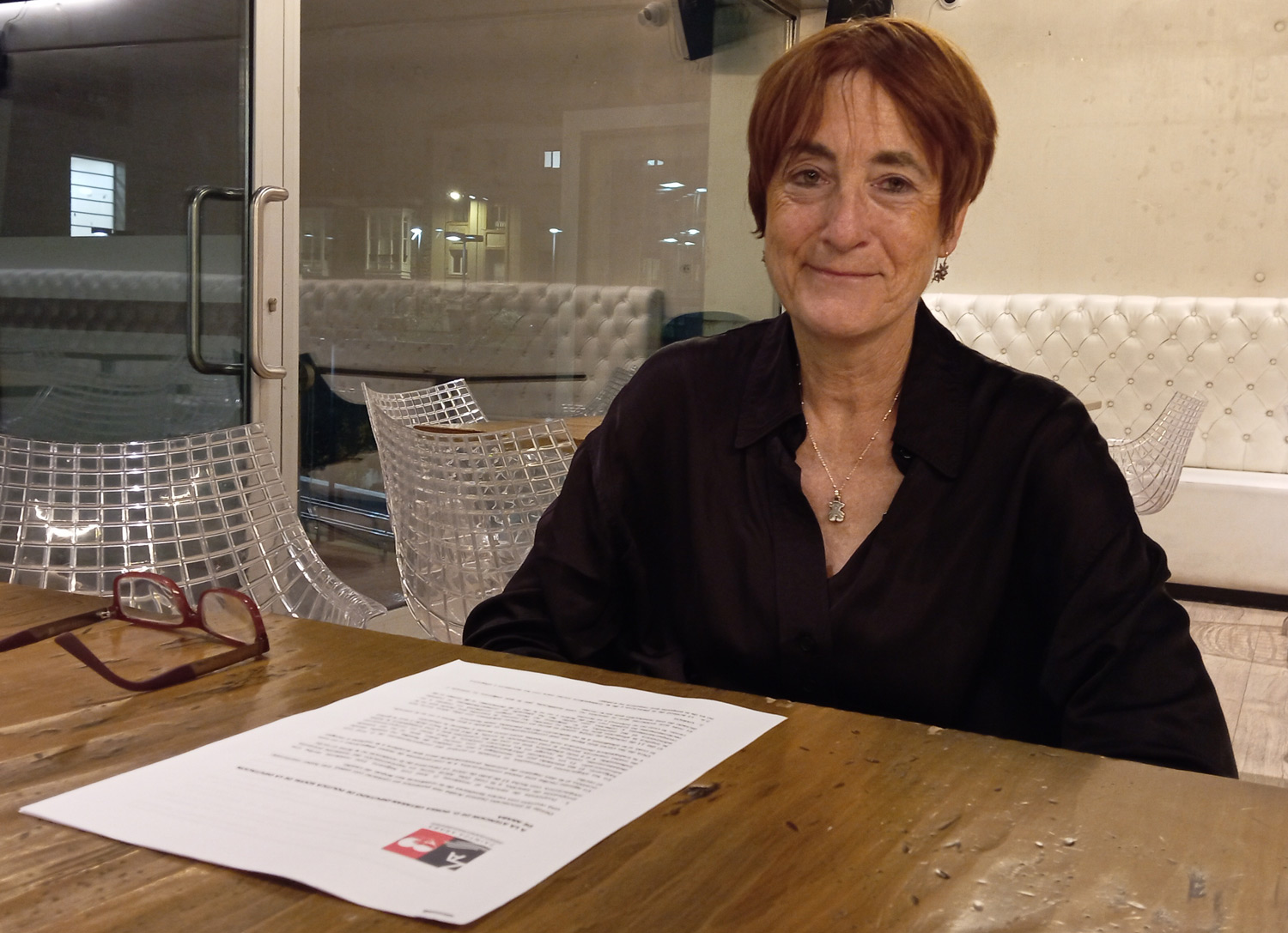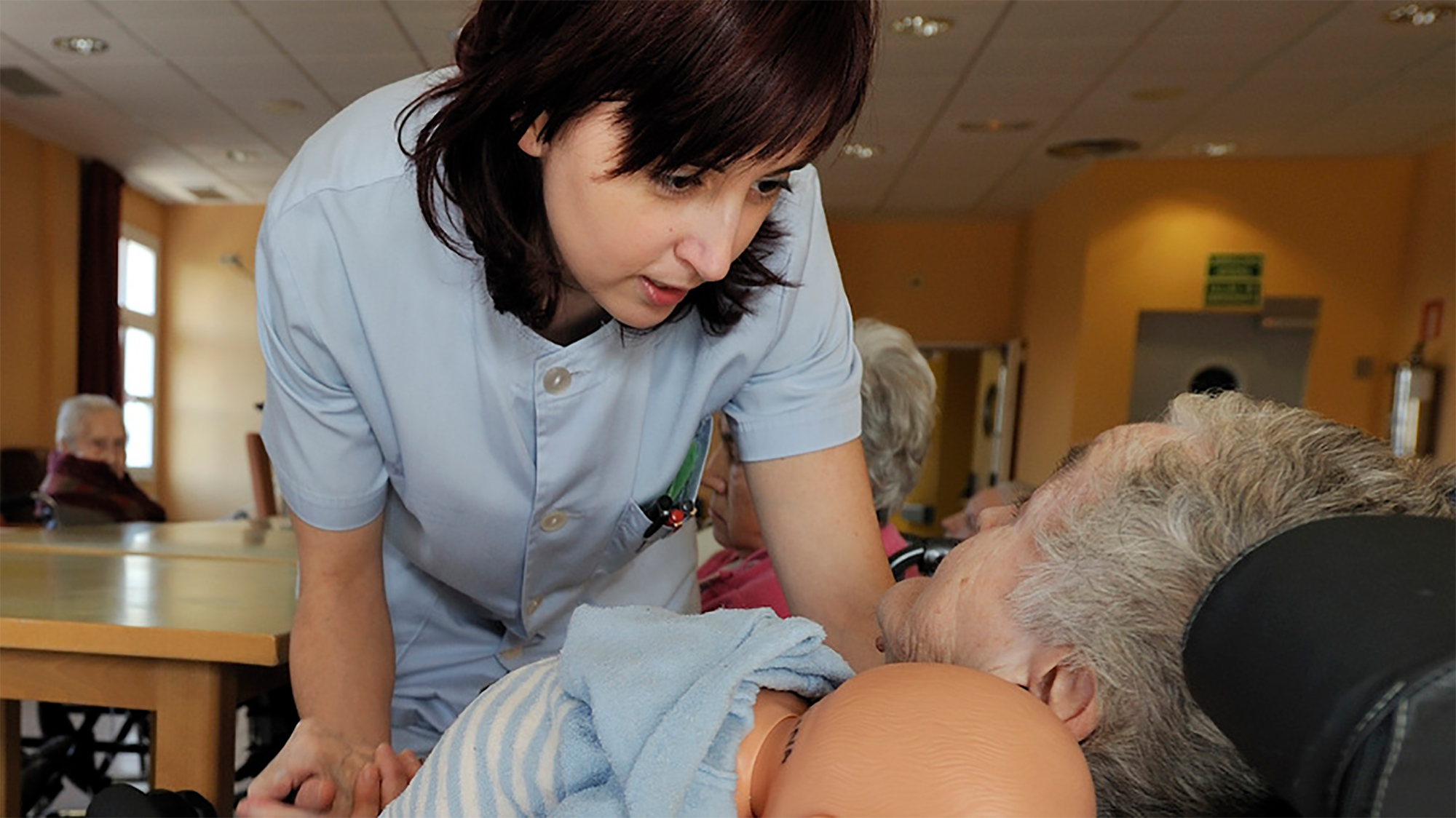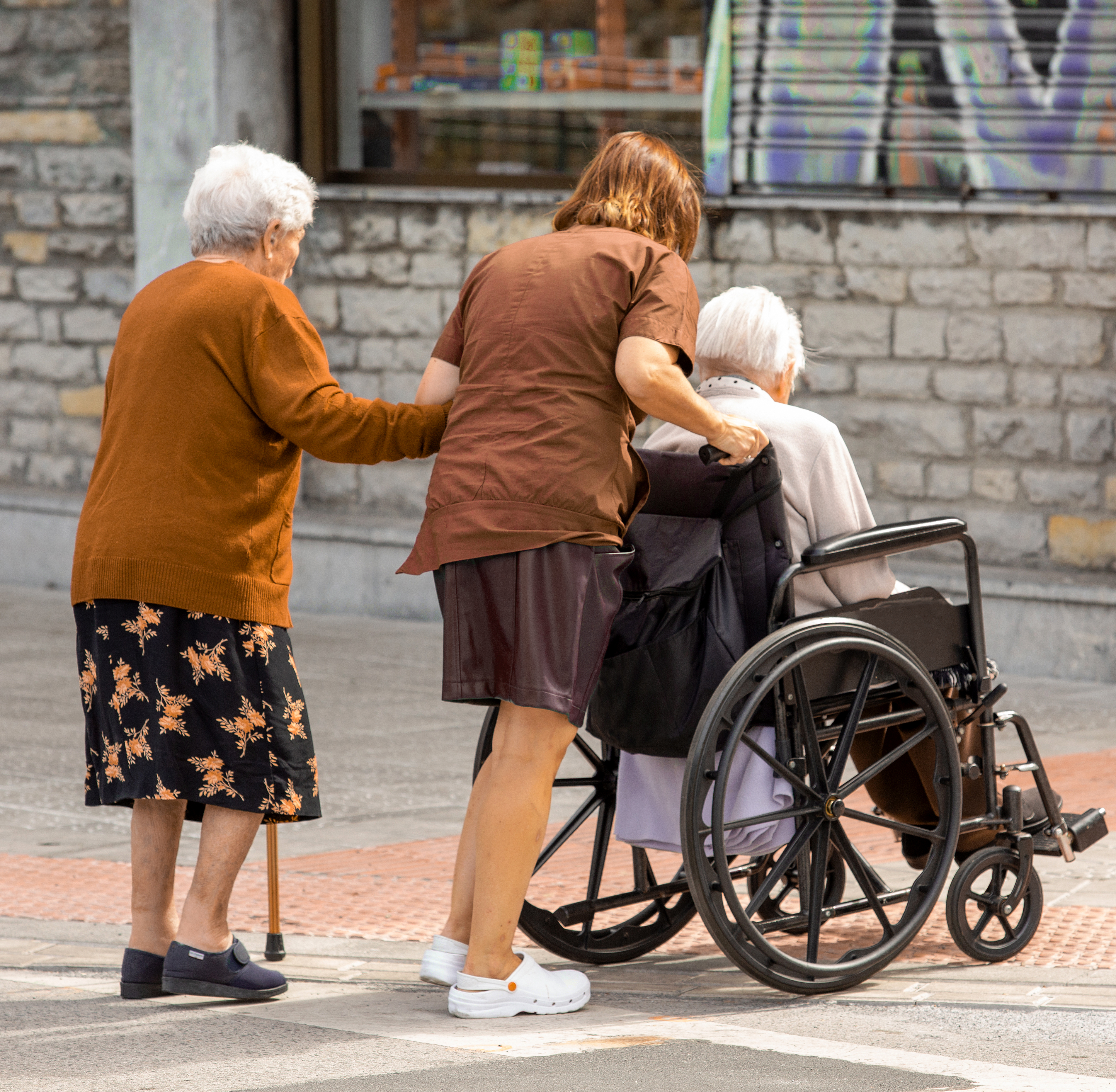Insufficient hands
- ELA has called strikes throughout February for workers in private residences in Bizkaia. The working teams are calling for the conditions to be extended and improved in order to offer a quality service to users. The workers have appealed to the Provincial Council of Bizkaia to intervene in the imminence of public money which is also involved.

The ELA trade union has denounced that the precariousness and greed of the companies have left the workers of the residences in Bizkaia "in a critical situation". The lack of staff to care for the elderly is not enough and, as it cannot reach all tasks, workers are drowned every day. “We don’t have the hands to work that hard,” they say. No agreement has been reached in the negotiations between employers in the sector (GESCA, ELBE and LARES) and trade unions. They have therefore decided to go out into the street: throughout February ELA has called for a strike and are organising numerous protest activities.
One of the objectives of the protests is to draw attention to the situation in society. “The Foral Council of Bizkaia and companies want to hide this,” said Ander Akarrangi, a member of ELA. He is in charge of establishing the relationship between the workers and the union. “The Diputación wants to privatize the residences with public money and the employers want to precarize the working conditions and the care of the users to increase the profits,” explains Akarrangi.
Workers complain of “physical and psychological exhaustion”
The only union that has called for the strike is ELA. Despite this, other trade unions have also been in favour of the demands of workers. For example, LAB has repeatedly called for the housing management model to be changed to opt for a quality public service. It says that no one can be enriched with a public service. ELA, for its part, has met with all trade unions represented at the negotiating table. Although everyone agrees in the diagnosis, everyone except ALS has rejected the possibility of a strike.
Number of workers per person to be cared for?
The main demand is to change the ratio between workers and needs, which would alleviate workloads and bring dignity to both employees and users. The ratio has not been updated since 1998. That year, the Basque Government approved the decree, but workers and users agree that it is obsolete. In addition to residences, it regulates the entire addiction sector. The trade unions have called for the decree to be updated taking into account all the actors involved.
ELA says that the most urgent thing is to increase the ratio of those providing non-specialized direct care. In the case of people with dementia, they want at least one worker for every five residents. In the case of users who adapt themselves, one for seven. Akarrangi pointed out that “ratios should be updated in all categories, but the toughest physical and psychological workloads are the most urgent, due to the great dependence of residents”. That is, the category of managers and collaborators.
.jpg)
according to data provided by ELA. The union believes that if the majority of the workers were
men the conflict would have been resolved long ago.
(Ed. : Luis Jauregialtzo / Argazki Press)
“When the current decree came into force, in 1998, the ratios were balanced, but the situation has changed a lot since then,” said Zoa Sáenz de Santamaría, who works in a Erandio headquarters. “Now, many users have 2nd and 3rd grade dependency and need more attention.” Sáenz de Santamaría says that since there are few workers “cannot reach”, “we have to take care of each person in a hurry, the service is bad... In the end it influences the users.”
Like the public headquarters
Regarding the solution to the problem of ratios, ELA considered it essential to agree decent working conditions for workers in residences, which are currently “in precariousness”. It has called for an increase in wages and the establishment of a 35-hour working week and for the Government's Labor Reform "to be sent out" of the residences. ELA also refers to the elimination of the instability generated by temporary working hours, the proper regularisation of diseases and the adoption of conciliation measures.
The long-term objective is to eliminate the differences between the working conditions of employees and subcontractors in public residences. According to data from ELA, in the residences managed directly by the Provincial Council of Bizkaia the ratios are higher in all categories, have fewer working hours and salaries are between 40 and 60% higher. These workers are not covered by the Bizkaia Private Residences Convention and are therefore not called on to strike. The spectre of precariousness is seen further in public offices, but trade unions have denounced the interests of fully privatising the sector.
Over 80 days of strike
This is a complicated case, that of the residences of Bizkaia. This strike is by no means the first that has been organised in recent times. Almost a year ago, in March 2016, the first strike took place and more than 80 days of strike have already passed. Over time, the intention is for protests to get tougher and harder. Thus, the February strike is the longest that has been carried out so far, as it will last for a month. There have also been many demonstrations and demonstrations throughout the morning, taking advantage of special events.
Residences run directly by the Member have fewer working hours and salaries are between 40 and 60% higher
“We have brought people to the people the cry of our struggle, it can be said that in Bizkaia there have been no popular acts that we have not been,” explains Ander Akarrangi. Among others, they have approached the fair of Santo Tomás, the football matches, the Durango Fair or the Last Monday of Gernika.
Furthermore, the strike in the residences of Bizkaia is not an isolated case. “Lately we are fighting a lot in Euskal Herria to improve the working conditions of the residences,” says Akarrangi. In Álava, Gipuzkoa and Navarre the situation is better, but these are improvements obtained through the action of the initiative. Akarrangi recalled the strike of Ariznabarra women in Vitoria-Gasteiz, two years, nine months and seventeen days: “It was a precursor to the struggles in the residences.”
Call to the institutions
In Bizkaia, the conflict has also begun to acquire a far-reaching image. “After 80 days of strike, we still do not have a proposal that takes decent working conditions on the part of the employers,” Akarrangi said. The negotiations are slow and ELA has asked the Provincial Council of Bizkaia to become more involved, as the conflict in residences is also the responsibility of public institutions. “70% of private residences are funded by the Council, which has to do with the proper use of this public money.” Akarrangi believes that the fact that workers work in the right conditions and that users receive a quality service is something that the Council should monitor.
For its part, the Council has chosen to negotiate between employers and trade unions in order to find a solution. “ELA wants to divert attention, making the Deputy guilty of everything, but what needs to be done is to start serious negotiations,” said spokesman Elena Unzueta. He added that the main obstacle to the agreement is the ratios and that the Member put a proposal on the table. ELA has accused the MEP of pleading with private companies and of "putting pressure" on workers to agree to this.
The main demand of strikers is to change the ratio between workers and needs, which would alleviate workloads and dignify workers and users
The strikers’ demands have also come to the Basque Parliament, where they have called for mobilisation. At the initiative of EH Bildu, the Members unanimously adopted the proposal at the plenary session on 9 February. It calls on the Basque Government to participate in the housing conflict and to update the 1998 decree.
Besides the ratios adapted to the needs, the new decree would regulate the material resources of the residences. Thus, in addition to improving the conditions of the workers, the demands of the users would be met, which led to the parliamentary session many complaints about the service provided in the residences. EH Parliamentarian Bildu Jasone Agirre has pointed out that “this is the first step towards dignifying the working conditions of the workers in these centres and, at the same time, the care provided to the elderly”.
Exhausted workers
The Deputy General of Bizkaia, Unai Rementeria, called for the continuation of the negotiating path on the eve of the February strike. PRESIDENT. — The next item is the joint debate on the following motions for resolutions: The workers are visibly more pessimistic and, furthermore, the environment seems to have worsened again. “The Provincial Council and the Basque Government are not really aware of our situation,” says the worker Zoa Sáenz de Santamaría. “Some goals are set, for example to help ten or twelve people to get out of bed, and it squeezes us a lot to get there, many times we don’t have time or to talk to those who are under our care.”
Sáenz de Santamaría tells us that “physically and psychologically” are exhausted. “When I get into work, I think, ‘Please, no unforeseen events occur today, otherwise I will not get to do everything,’ we are desperate.” Operators say that they do so at all locations.
.jpg)
Fighting women
92% of the workers are women in the residences of Bizkaia, according to ELA data. The social partners have repeatedly denounced the precarious conditions of the feminized sectors, compared to the work areas in which men predominate. “In sectors where there are many women, temporary contracts, job availability at any time, low wages and the black economy predominate,” explains Ander Akarrangi.
This situation prevents women from accessing autonomy and conciliation. ELA Secretary General Txiki Muñoz has made it clear: if the majority of workers were men this conflict would have been resolved a long time ago.
“Equality is an empty speech,” added Ander Akarrangi. In the current crisis situation, it sees a strategy to take women out of the labour market to return to their homes as subordinate subjects. “Fortunately, the group of working women, instead of being passive victims, is organized,” says Akarrangi.
Ready to continue in the protest
The month of February progresses and, if the situation does not improve, ELA has announced that there will be more protests in the Basque Autonomous Community. “We will seek the adhesion of other collectives: pensioners, feminists...”, explains Ander Akarrangi. “We want decent work and better social services and we will work with all people who are aligned with these goals.” If public institutions and employers do not listen to him, they behave “more harshly”, as this “outdated and precarious model” leaves workers and users in a critical situation. “There is no excuse for not participating in the mobilizations, this conflict meets all the conditions: gender, being a public service outsourced with everyone’s money and precariousness.”
Enpresak alde batetik, langileak bestetik, erdi-erdian harrapatu ditu gatazka honek Bizkaiko zahar-etxeetako 10.000 erabiltzaileak. Haien ahotsa ere entzun dadin, erabiltzaileen senideak Babestu izeneko elkartean batu dira, kalitatezko zerbitzu baten alde. “Langile nahikorik ez zegoela sumatzen orain dela urte batzuk hasi ginen”, dio Juani Céspedes elkarteko presidenteak, “baina orain izugarria da”.
Iraide Urriz Babestuko beste kide batek beren asmoen berri eman digu. Ratioa gutxienez 0,36ra igo dadila eskatu dute, alegia, langile bat hiru oheko, baina ohartarazi du zenbaki horrekin “tranparik” ez dutela nahi. “Erabiltzaileei zuzeneko arreta ematen dieten langileak kontatu ditzatela ratioaren kalkuluan, ez enpresako edozein langile”. Babestuk salatu duenez, psikologoak, idazkariak eta abar sartzen dituzte ratioan, “baina pertsona batek komunera joan nahi badu, zentroko psikologoak ez du lan hori egingo”.
Egoera gertutik ezagutzen du Urrizek, ama erresidentzia batean baitu, eta langile nahikorik ez dagoela garbi ikusten duela dio: “Gertatzen da, adibidez, jateko orduan batek komunera joan nahi izatea eta ezin izatea, langilerik ez dagoelako”. Menpekotasun handiak dituzten pertsonak direla gogoan izan behar da.
“Enpresak dirua ateratzeko daude”, segitu du Iraide Urrizek, “kalkulu matematikoak egiten dituzte, lana zenbat denboran eta zenbat langilerekin egin daitekeen jakiteko, baina erabiltzaileak ez dira makinak, pertsonak dira!”. Bere ama behin goizeko 6:30ean esnatu omen zuten, bestela langileari ez ziolako astirik ematen zegozkion pertsona guztiei garaiz jaikitzen laguntzeko.
Kalitate eskaseko zerbitzu hori enpresen errua dela uste du Babestuk eta, beraz, beharginen eskariekin bat egin du. “Zorionez, langileak oso profesionalak dira eta zerbitzu duina ematen ahalegintzen dira, sarri dagozkien baino ordu gehiago lan eginda, kobratu gabe noski”, dio Urrizek. Enpresak beharginen borondate onaz “aprobetxatzen” direla salatu du.
Egoitzetako plazen erdia inguru diru publikoz finantzatuta daude eta, horregatik, Bizkaiko Foru Aldundiaren jarrerarekin haserre daude, “ez diote gaiari heldu nahi”, dio Juani Céspedesek. Langileen mobilizazioekin bat egiteaz gain, bere kabuz ere ari da Babestu. Bideo bat prestatzen ari da Arartekoari bidaltzeko eta Eusko Legebiltzarrean txosten bat aurkeztu du, egoitza pribatuetan eskaintzen den zerbitzuaren kalitatea agerian uzteko asmoz. Gabezia handiak daudela salatzen dute: botika nahikorik ez, azpiegitura zaharkituak edo desegokiak, kalitate txarreko materiala...
Herri ekimen legegile baten bidez, 1998ko dekretua eguneratzeko eskatuko dute senideek. Bestetik, enpresei ordaindutako diruaren zati bat bueltatzeko eskatuko diete. Babestuk salatu duenez, greba egunetako lansaria kendu diete langileei, baina erabiltzaileei ez diete itzuli, kalitateak behera egin arren. Alegia, greba dela-eta eman gabeko zerbitzu batekin dirua irabazi dute enpresek. “Konpentsazioa eskatuko dugu, moralki eta ekonomikoki hala dagokigulako”, dio Juani Céspedesek. Enpresen eta sindikatuen negoziazioekin ezkor samar dago baina itxaropena badu, “asko dagoelako konpontzeko”. Zahar-etxeetako erabiltzaileek duintasuna merezi dute, haren esanetan.
Urkullu has on many occasions called for the public-private partnership that is at the heart of the capitalist system, but without any intention of explaining what that connection is today. When the public is complementary and dependent, it cannot oppress the interests of the... [+]
The images that the metal sector strike has left in Bizkaia in the last two weeks are once again spectacular. There are those who talk about the end of the labor struggle, nostalgia for the Euskalduna times, but the reality is that the number of labor conflicts in Euskal Herria... [+]
























